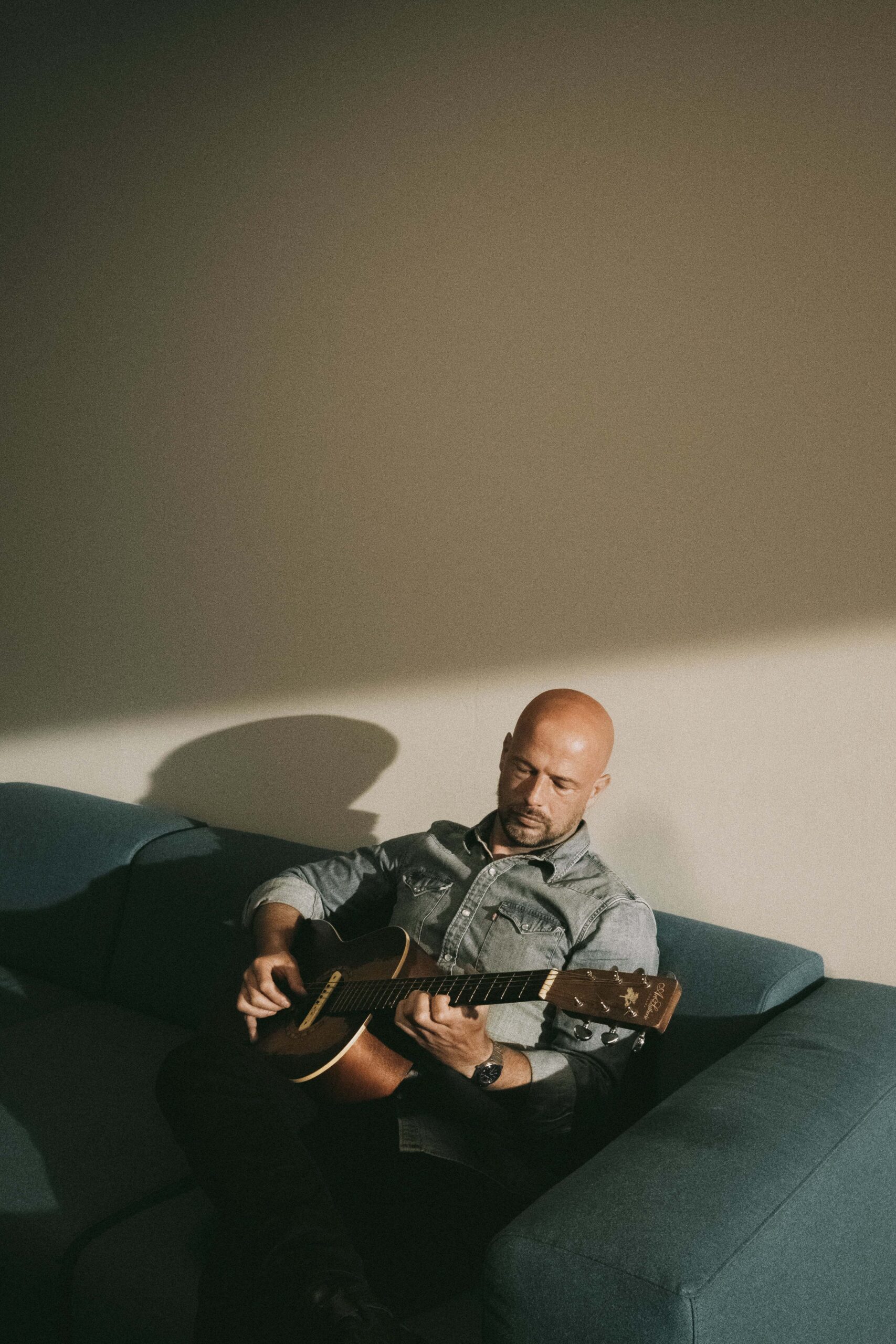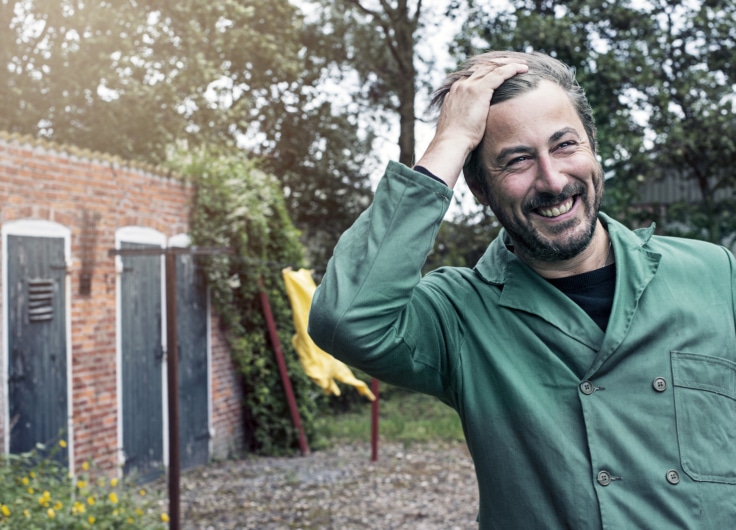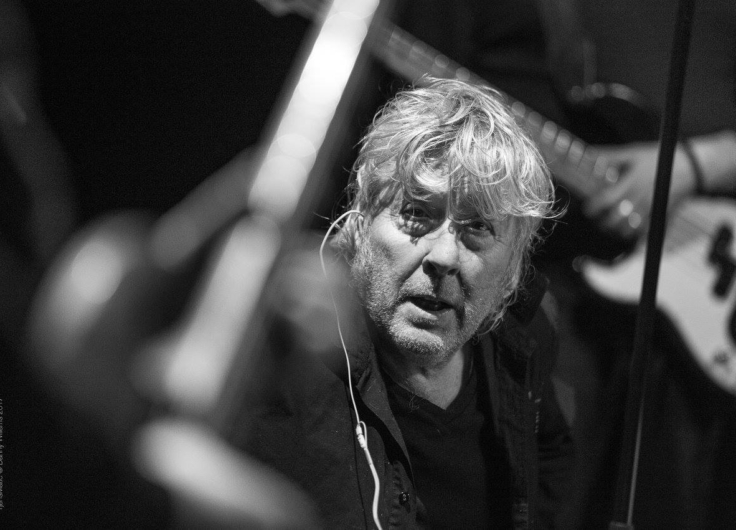The Musical Receiver Within Flip Kowlier
As a musician he aims to be playing with others but as a songwriter Flip Kowlier prefers to watch from the sidelines. His sixth album September features characters who are, more often than not, the tragicomic playthings of fate. Kowlier describes their experiences with irony and wit alongside the hearty dose of self-mockery that is always served up by this ambassador of West Flemish, who surprisingly often reveals his weaker sides
in his songs. ‘Wist je dat in bad zitten skrjim ne vorm van bespaering is?’ (Did you know that crying in the bath is a form of saving?)
Flip Kowlier, born in 1976 as Filip Cauwlier, wears many hats and wears them all well: as a rapper with ’t Hof van Commerce, co-frontman with electrofunk band Ertebrekers, musician with the resident orchestra of the satirical television program De Ideale Wereld (The Ideal World) and esteemed solo artist.
 Flip Kowlier
Flip Kowlier© Piet Stellamans
He studied bass guitar at the Antwerp jazz studio and took his first musical steps with groups such as Prophets of Finance and My Velma, the power-pop trio of musician and television producer Jan Leyers. Kowlier was only 21 when the full-length debut of ‘t Hof van Commerce, a hip-hop posse that mainly parodied the tough posturing of American rappers, was released. Kowlier recalls: ‘We found it hilarious to stick West Flemish lyrics on the records we were listening to at the time. We grew up in Izegem, where you’d be hard-pressed to find any unrest or crime. We didn’t want to pretend otherwise, so we stuffed our songs with jokes and pranks. At the same time, I realized how much better this worked in my regional language than, say, in English. Suddenly I was rapping about what I was really thinking. The lyrics did not seem to make sense, but I felt they did. Hence, the use of dialect became a conscious choice. I think West Flemish is a very musical language. And more importantly, it is closer to my own reality.’
‘t Hof van Commerce was lucky enough to be picked up by the youth radio station Studio Brussel in 1997, allowing it to become a source of inspiration for artists such as Brihang and Het Zesde Metaal. ‘There were no great intentions behind what we did,’ says Kowlier. ‘We only recorded our songs in hopes of picking up a few gigs in youth clubs.’ Because the boys of ‘t Hof used their local language, their geographical scope was somewhat limited, but according to Kowlier this had its advantages too: ‘We didn’t have to worry about expensive video clips or major tours, so we could keep a handle on the situation.’
Small-scale, but ambitious
Using the West Flemish dialect also brought with it a certain sobriety. For instance, on his solo debut Ocharme Ik (2001), which leans towards folk rock, and on which he proved himself as a singer-songwriter for the first time, Kowlier stated that love is no more than ‘een kweste van organisatie en goeste’
(a matter of organisation and appetite). ‘That mindset has more to do with the regional mentality than with the language itself,’ he argues. ‘The average West Fleming will say: just act normally, that’s crazy enough.’ But even though the artist prefers small-scale performances, he certainly does not lack ambition. On Cirque (2013), a concept album about the decline of a popular form of entertainment, he collaborated with the London Chamber Orchestra and the Briton Andrew Powell, who wrote arrangements for Kate Bush and Alan Parsons, amongst others.
Kowlier has made it clear that he considers himself a writer rather than a musician, but he would like to add some nuance to his claim: ‘I feel more like a musician than a singer. I now attach much more value to playing music with others. There’s something special about it. It creates magic and connection, a connection that opens a gate in your brain. But above all, I’m a storyteller. The story is important. That’s why the music has to be stripped-down, because less is more. I like to hear a real band at work, as long as they don’t play anything more than is strictly necessary’.
In his lyrics, Kowlier says it all while deliberately opting for simplicity. ‘At the same time, there are several layers to my work and sometimes it is about more than you would suspect at first hearing. But the listener is free to notice that or not. I allow my songs to take on a life of their own. In the past, I sometimes thought I was writing fiction, until I realized that it was not fiction at all. Sometimes things creep in that you’re not aware of and that you only interpret afterwards as an extra layer of meaning.’ He chuckles. ‘That way you get a chance to learn something about yourself.’
Kowlier: 'In the past I sometimes thought I was writing fiction, until I realized that it was not fiction at all'
Kowlier believes that listeners can get to know him quite well through listening to his records. ‘’k ben broaver dan dak zoe wil / Ben slichter dan dak goa toegeven’ (I’m better-behaved than I’d like to be / I’m worse than I’ll admit), as he says in ‘Verkluot’. ‘Ik ben in feite wel ne vint van woorder moa hin doadn’ (I am in fact a man of words, not of deeds) we hear in ‘Voyeur Superieur’. In ‘Vergeten’ the artist confesses: ‘Ik ben ne getrainde machinist mor ik bluvve lik ontsporen.’ (I am a trained machinist but I keep going off the rails.) As Kowlier asserts: ‘I used to write more cryptically because I was afraid of giving the listener a too direct glimpse into my soul. But that fear is gone. At the end of the day, we all have our weaknesses. Having said that, I still tend to throw some obstacles into my own path that seem bigger than they actually are.’
Conquering fear with a smile
In his songs, Kowlier often assumes the role of an observer, preferring to watch from the sidelines rather than join the action. ‘I quickly fall silent when I’m in a group,’ he explains. ‘I listen to what people say and watch what they do. Sometimes I go and sit discreetly at a table in a corner of a bar. As a songwriter, I use what presents itself. Sometimes an observation produces a single useful sentence and then I just make up the rest. Musically, I’m kind of like a receiver. The trick is to pick up a tune out of thin air at just the right time.’
Kowlier: 'The trick is to pick up a melody out of thin air at just the right time'
In the past, the singer has sometimes appeared to be a “news avoider”. He believes that the negative messages that constantly feed our fears too often are lacking relevance. So what about a family drama in, say, Kentucky? ‘I do know more or less what’s going on in Ukraine, but I really don’t need to be reminded every morning of where bombs have fallen and how many casualties they have caused. I know in advance I will not use that information. I’m not an activist or do-gooder.’
That does not alter the fact that social commentary occasionally shines through in Kowlier’s songs. Fifteen years ago, in his reggae song ‘Bom Bin’, he claimed that ‘Ti nuoit saai in den oorlog’ (War is never boring). The same sarcasm pops up in ‘El Mundo Kapotio’: ‘Hjil de wireld is kapot / Wint uteindelijk gekun / Widder zinne nu God / En we zin nog moa behun.’ (The whole world is going to hell / We finally managed to do it / We have turned into Gods / And we’ve only just begun).
Kowlier: 'As far as I’m concerned, a concept like Original Sin is the real evil.'
Religion is yet another theme that concerns Flip Kowlier. In ‘Vredeslied’ he presents a pastor whose God turns a deaf ear to his prayers. And in ‘Jinzame Vinten’ he shouts ‘Weg met da Katholiek schuldgevoel, wan wik i god voer u gedaen?’ (Down with that Catholic guilt, because what has God ever done for you?) ‘I have nothing against the good citizen who goes to church on Sundays and takes comfort in his faith,’ emphasizes the singer. ‘But I went to a Catholic school and hated the fear and guilt that was pushed on us to keep us in line. As far as I’m concerned, a concept like Original Sin is the real evil.’
Kowlier views anger as unproductive, so he often turns to humour to address what’s troubling him. His most recent record September
(2022), which is his sixth, features a fictitious telephone conversation with Jesus whom, according to the logic that we are all children of God, he simply considers as his brother. This immediately brings up a pertinent question about the supreme being: ‘Ge moet u wel ofvragen / met mjir dan zeven miljard kinders / Oeveel vrouwen ét ie em in feite ton wel get?’ (You have to ask yourself / With more than seven billion children / How many wives did He have?)
Kowlier is clearly no stranger to a certain irony. Many of his characters are pawns in the tragic comedy of fate. The fairground stall holders ‘Angelo & Angelique’, for instance, have been saving for a house their entire lives, but they are almost never at home. In ‘Moeder, lieve moeder,’ a son confesses to his dying father that he is gay, only to learn that his father had actually the same sexual orientation – a fact he kept hidden from his wife because ‘in minnen tid was dat o zuo gemakkelik niet’ (In my day, it wasn’t that easy.) ‘Smetvrjis’ is downright hilarious at the point when a compulsive cleaner explains: ‘Ki moaten verloren / Deur met de stofzugger per ongeluk / Unere coke weg te doen / Kpeizde dat talkpoeier was.’ (I’ve lost friends / Sucking up their coke / by accident with the vacuum cleaner / I thought it was talcum powder.) Sometimes the humour goes sour. In a song about amnesia, the singer complains ‘mor ik vergete iglik nuois wik dak wille vergeten’ (but I never really forget what I would like to forget.) A similar frustration rears its ugly head in ‘Welgemeende’: ‘nu dak unne nummer goe vanbutten kenne / zin der hun redens mi voer u te beln.’ (Now that I know your phone number by heart / there are no more reasons to call you.)
Kowlier: 'When I talk about sad things, I prefer to allay that feeling with a smile'
On the album September
the desperate announcement ‘ooit spring ik in de vaert’ (someday I’ll jump in the canal) is immediately followed by a series of conditions: ‘moe’t goa moeten warme zin en proper / En van niet t’uoge / en k moe nen antoek in.’ (but the water must be warm and clean / And I won’t jump from too high / And I must have a towel.) ‘Like so many people, I sometimes feel very low,’ acknowledges Kowlier. ‘I have an anxiety disorder which, thanks to medication, I am able to control fairly well. But when I talk about sad things, I prefer to allay that feeling, both for myself and for the listener, with a smile. In general, I am very optimistic. I do love being alive. In a song like ‘In de vaert’ I seem to reveal myself quite a bit. But whether those revelations are based on true events is never stated,’ he laughs.
Clown at a funeral
Kowlier often writes about outsiders and underdogs, people with complexes who doubt themselves, struggle with their own weaknesses and shortcomings and who are, to a certain extent, communicatively handicapped. ‘Zie hie echt nie dak nie passe ip die wireldbol?’, (Can you really not see that I don’t belong on this globe?) the main character in ‘Triestig feit’ wonders. And from the narrator of ‘Raar’ we learn: ‘Soms voelek mie verkjird gecast / Ne clow ip nen utvaerdienst / Een slang in een veugelnest.’ (Sometimes I feel miscast / Like a clown at a funeral / A snake in a bird’s nest.) A story is more interesting if there is a bit of drama in it, says the singer. ‘I’ve learned that it’s best to make it as difficult as possible for your characters to get from A to Z. And you know, in high school, I didn’t really fit in. I felt like an extra. I was accepted, but I knew I was different.’
 Flip Kowlier: 'Laughing at yourself is the best way to protect yourself from other people's comments’
Flip Kowlier: 'Laughing at yourself is the best way to protect yourself from other people's comments’© Piet Stellamans
Kowlier himself is always up for a bit of self-mockery. ‘Moest ik oar in ’k zou ’t 77 kjirn kam’ (If I had hair, I would comb it 77 times), he sings in ‘Ti Woa’. He regularly introduces himself as a character and lists all the gossip about him in ‘Slechte Mins’: that he is a softie who has lost his touch with the underground and is selling out artistically. He also rubs some salt in the wound in ‘De Man van 31’: ‘Ik i een klijn probleem. ‘k drienke veel te ville.’ (I have the slightest problem. I drink far too much.) In ‘In de fik’ the same idea taunts us again: ‘Flip Kowlier is aan den drank.’ (Flip Kowlier has a drinking problem.) However, that accusation is no longer justified. The artist has not touched a drop of alcohol in the last ten years. ‘I used to be a social drinker. I only drank in company, when the opportunity arose, but the opportunity arose just a little too often. Unfortunately, it was very difficult for me to quit. But in those songs, I am mainly suffering from imposter syndrome. Making fun of yourself is the best way to protect yourself from other people’s comments.’
If Flip Kowlier has one specific plan, it is to keep making music and make a living from it. ‘I’ve never done anything else and I’m not dependent on anyone. I consider that an achievement in itself. I feel a great urge to create, but I don’t think too much about what I’m making. I want to keep my business going, so it’s important that my songs get on the radio. But now I realize that I don’t really have any control over that. So I do what I feel like and, beyond that, I just try to be the best possible version of myself.’










